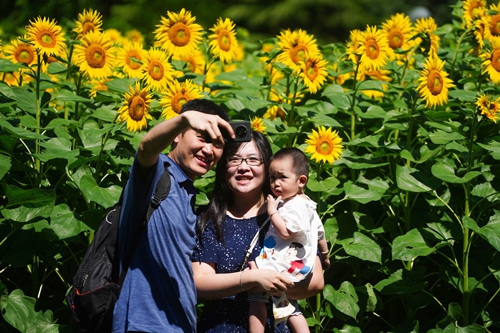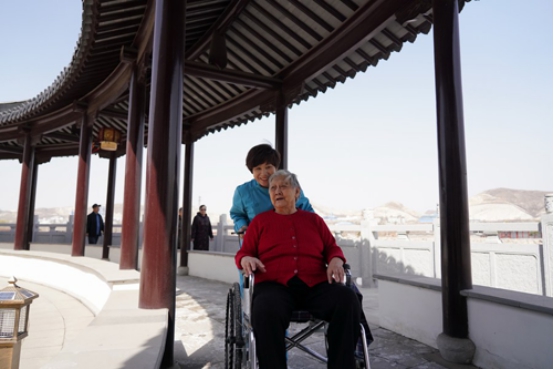ZHANG Min:China has expanded on UN‘s declaration on human rights

A family takes photos against a backdrop of blooming sunflowers at the Olympic Forest Park in Beijing, on July 4, 2021. [Photo/Xinhua]
Editor's note: Zhang Min, a professor at the Institute of European Studies at the Chinese Academy of Social Sciences, talks with Rui Lourido, president of the Observatory for China, a think tank in Portugal, about Lourido's perspective on human rights and democracy. This is part of the dialogue.
Q: How do you define human rights?
A: I consider that the only acceptable ethical model or guide is the United Nations Universal Declaration of Human Rights (approved on Dec 10, 1948), comprehensive and inclusive of civilizational models that respect and recognize the dignity of human beings and their equal rights and inalienable freedom, justice and peace in the world. We must also take into account that ... the United Kingdom, France and the United States were (once) colonialist countries, and racial discrimination was institutionalized and was practiced in the metropolis and colonies.
China respects and implements the rights expressed in the Universal Declaration of Human Rights (the right to work, the right to economic activity, the right to access health and education, social security,... the right to self-determination and independence, and the refusal of the hegemony of one state over the other states of the world) and expands the guarantees of the Universal Declaration of Human Rights by adding two guarantees (of adequate food and clothing) and three rights: of access to compulsory education, of basic medical services and of good housing.
China is historically the first Asian country to manage to eradicate absolute poverty from its territory in 2020. The line below which the state of poverty is defined, used by the World Bank, is $1.90 a day. However, China was more demanding, and the... government implemented a threshold above $2.30.
Q: What is your opinion of the development process and current situation of Chinese-style democracy and human rights?
A: China is a country with a representative democracy regime, in compliance with Article 21 of the Universal Declaration of Human Rights.
Listening to different opinions and perspectives is a general rule in the Chinese order. The Communist Party of China is the ruling party....The Chinese People's Political Consultative Conference serves as a key mechanism for multiparty cooperation and political consultation under the leadership of the CPC, in which the eight non-Communist parties and representatives of all social forces and ethnic groups in China participate.
These human rights are not only theoretical, but have a very real application in the daily lives of populations, namely through China's urban and rural subsistence allowances, universal health coverage, promoting education equity, overcoming poverty and achieving an all-around, well-off society. This is a fundamental factor for the well-being of populations.
Q: What impressed you about the democratic ideas put forward by Chinese leaders in recent years?
A: Among the different democratic systems existing in the world, I consider that China has created important opportunities and benefits for its population.
Precisely because the Marxist philosophy of the Communist Party of China puts the general interest of the people at the center of its policies, China is the first Asian country that has managed to eradicate extreme poverty from its territory (in 2020), and not only concerned itself with the Han majority of its population, but directed specific measures to favor and increase the living conditions of its ethnic minorities and autonomous regions.
We know that 70 percent of the world's poverty reduction over the past 40 years has taken place in China, which means that the 2030 UN poverty reduction target for sustainable development was achieved by China 10 years ahead of schedule.
Another example is the posture of the government of China, in the face of the COVID-19 pandemic, which from the beginning tried to protect the lives of its citizens above economic interests. China has managed, in this consistent and persistent way, to be one of the countries, if not the only country, with the most success in combating and controlling the pandemic.

An elderly woman enjoys leisure time with a nursing worker at the Tangshan Anxin Medical Pension Manor in Guye District of Tangshan City, North China's Hebei province, March 24, 2021. [Photo/Xinhua]
Q: President Xi Jinping pointed out that "countries have different histories, cultures, systems and development levels, but the people of all countries pursue the shared human values of peace, development, fairness, justice, democracy and freedom".What is the significance of this concept in promoting global governance and establishing a new type of international relations?
A: In the Portuguese language, we have a popular expression that says, "Only those who wear the shoe know if it fits their foot." Considering that there are several types of democracy in the world, only the population of each country can and should choose their own democratic path according to their national conditions, without illegitimate external interference.
China's democratic and socialist system reflects the will and interests of the Chinese people, expressed in ... assemblies in the various national constituencies and confirmed in the elections held in the annual sessions of the National People's Congress and the Chinese People's Political Consultative Conference.
I would like to highlight the correctness and depth of President Xi's thinking when he points out that the people of all countries pursue the shared human values of peace, development, fairness, justice, democracy and freedom.
In my opinion, peace is the most important principle of international relations. Civil society cannot and must not accept the spread of bellicose rhetoric from developed countries in the West against other countries that are asserting themselves and recovering their development in Asia and in the East. Only through equal dialogue, through win-win negotiation and through the preponderance of diplomacy will we be able to create conditions for a common and fair development for all. It is necessary to refuse the hegemony of one country over others.
In conclusion, I would like to mention that the recovery and development of China and its return, as a responsible great power, to the international stage is not a threat to Europe, the US or any other country.
China should be seen as a strategic partner that contributes to the positive resolution of many of the main problems that affect Europe, the US, Russia and the rest of the world today.
Demonstrating that the only solution to the great global problems can only be reached through dialogue and negotiation, China once again with responsibility and commitment at COP26 (the 26th UN Climate Change Conference of the Parties) in Glasgow reached a bilateral agreement with the US for reducing climate change.
Zhang Min,professor at the Institute of European Studies of Chinese Academy of Social Sciences.
The article was originally published in 《China Daily Global》 on January 16, 2022. The article has been authorized.
